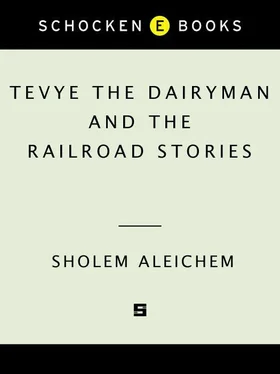In short, as soon as we got home I unhitched the horse and sat down outside to have myself a think what fairy tale to tell the wife — anything to keep me out of trouble. It was evening and the sun was going down; from far away came the croaking of the frogs; my fettered horse stood nibbling grass; the cows, back from pasture, were waiting with their feedbags to be milked; all around me the greenery gave off a smell like Paradise. And as I sat there thinking about things, it struck me how cleverly the good Lord had made His world, so that every creature, from man to beast, could earn its keep. Only there were no free lunches! You want to eat, Mrs. Cow? Then let’s have some milk, help a poor Jew support his wife and kids! You want some grass, Mr. Horse? Then please be so kind as to trot over to Boiberik with these milk cans! And you too, Mr. Man, you want some bread for your belly? Then off your butt and milk the cows, carry the cans, churn the butter, make the cheese, harness the horse, go early each morning to the dachas in Boiberik, scrape and bow to the rich Jews there, smile at them, fawn on them, make them feel special, be sure they’re satisfied — and whatever you do, don’t step on anyone’s toes … Except that here we come to one of the Four Questions: ma nishtanoh —where does it say in the Bible that Tevye has to work his bottom off and be up at the crack of dawn every day when even God is still snoozing away in bed? Where does it say that the rich Jews of Yehupetz must have fresh cheese and butter each morning for the rolls they eat with their coffee? Where does it say that I have to be dead on my feet to deserve a plate of grits and some soup that’s more water than barley, while they, the same Jews, can stretch and yawn without lifting a finger and be served with roast duck, juicy knishes, varnishkes, and blintzes? Am I less of a Jew than they are? When will justice be done, so that Tevye too can spend a summer vacation in a dacha in Boiberik!.. Who, though, you ask, would bring him his cheese and butter? Who would milk the cows? Why, the Yehupetz tycoons, of course!.. But I have to admit that was such a weird thought that it made me laugh out loud. How does the proverb go? If God were to listen to what each fool has to say, He would have to create a new world every day …
“Good evening, Reb Tevye!” I heard someone greet me.
I turned around and saw a familiar face, Motl Komzoyl, a tailor boy from Anatevka.
“Well, well, well, look who’s here!” I said. “If I sat here long enough, I bet even the Messiah would turn up. Have a seat on God’s earth, Motl. What brought you here of all places?”
“What brought me here? Why, my feet,” he says, sitting down on the grass and glancing at my girls, who were busy with the jugs and cans. “I’ve been meaning to drop by for a while, Reb Tevye, but I haven’t had a free moment. As soon as I finish one piece of work, it’s time to start on another. I’m in business for myself now and thank God there’s plenty of it — in fact, all we tailors are swamped. There’s been nothing but weddings all summer long. First Berl Fonfatsh married off his daughter; then Yosl Sheygetz; then Yankl Piskatsh; then Moyshe Gorgel; then Meir Kropeve; then Chayim Lushik; why, even Trihobikhe the Widow has gone and gotten herself hitched.”
“It certainly looks like the whole world is marrying,” I said. “I must be the only one not throwing a wedding this summer. I suppose God is too busy for one more.”
“Not at all, Reb Tevye,” he says, eyeing my girls again. “You’re wrong there. You can have a wedding whenever you want. It’s entirely up to you.”
“Just what are you trying to tell me?” I asked. “You don’t happen to have a match for my Tsaytl, do you?”
“One just her size!” he says in tailor talk.
“A serious proposal?” I say, thinking: bless my soul if he isn’t about to offer me Layzer Wolf the butcher!
“The perfect fit!” he says with another look at my girls.
“Where does this match of yours come from?” I ask him. “I’m warning you right now that if he smells of the meat counter, I don’t want to hear another word!”
“God forbid!” he says. “There’s not an ounce of meat on him. As a matter of fact, Reb Tevye, it’s someone you know well.”
“And you’re sure it’s on the up-and-up?” I say.
“Why, it’s so far up it’s heavenly!” he says. “It’s a dream — custom-made and alterations free.”
“In that case,” I say, “perhaps I can ask you who it is.”
“Who is it?” he says, stealing a sideways glance once more. “The match I have in mind for you, Reb Tevye, is none other than myself.”
I wouldn’t have jumped to my feet any faster if he had poured boiling water over me. He jumped up too, and we stood facing each other like a pair of fighting cocks.
“Are you crazy?” I said. “Since when can you be the matchmaker, the father-in-law, and the groom all rolled into one? I suppose you want to be the rabbi and the bandleader too! I never in all my life heard of a young man making matches for himself.”
“All your enemies, Reb Tevye,” he says, “should be as crazy as you think I am. You can take my word for it that they don’t come any saner than me. In fact, it’s a sign of my sanity that I want to marry your Tsaytl — and the proof is that even the richest Jew in Anatevka, Layzer Wolf, wants to take her off your hands free of charge. Do you think that’s a secret? Why, the whole town knows about it! And as for what you say about a matchmaker, I’m surprised at you, Reb Tevye. I wouldn’t have thought that a Jew like yourself had to be spoon-fed … But why beat around the bush? The truth of the matter is that your daughter Tsaytl and I decided to get married a year ago.”
I tell you, he might as well have knifed me in the heart! In the first place, how could a tailor boy like Motl even dream of being my son-in-law? And in the second place, what kind of decided to get married a year ago?
“Well,” I said to him, “and just where does that leave me? Did it ever occur to you that I might also be asked — that I might happen to have an opinion on my daughter’s future too?”
“Of course it did,” he says. “That’s why I’m here, to ask you. As soon as I heard that Layzer Wolf was interested in your daughter, who I’ve been in love with for over a year, as you know—”
“So far,” I say, “all I know is that Tevye has a daughter named Tsaytl and that you’re Motl Komzoyl the tailor boy. But what do you have against her that you want to marry her?”
“You don’t understand,” he says. “I’m not just telling you that I love your daughter. I’m telling you that she loves me too. It’s been over a year since we swore to be husband and wife. I had meant to talk to you about it long ago, but I kept putting it off until I had saved up a few rubles to buy a sewing machine and outfit myself properly, because anyone who’s anyone these days owns at least two suits and a pair of matching vests …”
“Tfu!” I said. “A child like you ought to be spanked. What exactly do you propose to live on after the wedding — the money you’ll get from pawning your stomachs, since you won’t be needing them anyway? Or do you plan to feed your wife matching vests?”
“Reb Tevye, I’m amazed at you,” he says. “I don’t believe you had a house to call your own when you were married, either — and yet just look at you now! What’s good enough for other Jews is good enough for me. And besides, I have a profession …”
Well, to make a long story short, he talked me into it. After all, why pretend: what do most Jewish children have in the bank when they marry? If everyone acted sensibly, there wouldn’t be a Jewish wedding in the world.
Читать дальше












